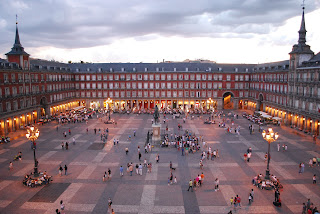... Czech Memories, Part I ...
My gateway drugs to Czech culture were Bedřich Smetana and Milan Kundera. I still remember long rides in my father's car, an old Audi 90, listening to Vltava (The Moldau), the famous symphonic poem by Smetana. The most thrilling moment inevitably came when, after the woodwind introduction, the strings suddenly enter almost as if opening up a huge vista, a panoramic view - like an eagle ascending from the valley towards the skies. In this very moment, always and without exception, my father would take both of his hands off the wheel and passionately - riskily too! - conduct the string melody while we both sung to the bottom of our lungs with the car windows open, almost as a hymn to life or to nature, and one that was exploding with joy, or at the least, with a joyful, almost ecstatic melancholy.
There was something in the lyricism of the piece that my father, of Basque origins, surely associated with a kind of nordic yearning present in his childhood. In these moments, the car seemed to be simply driven alone by the internal impetus and inertia of the music, its slancio, its Schwung. I was very young and knew no fear. And in one single epiphanic moment, I absorbed a threefold truth about music and myself: the importance of forward motion, of vocality, and of freedom.
Later in my life came Dvořák - especially his Ninth Symphony and his American String Quartet, Op. 96. And as our childhood is really our only fatherland, our only true homeland, this music was the soundtrack of mine: in my musical childhood, one could say I was partly Czech. Its heartbeats constituted the bulk of some of my first human and musical impressions. Incidentally, and by a serendipitous touch of fate, the Ninth Symphony came in an old cassette tape, given to me by one of my earliest musical mentors: my next door neighbour, Maximiliano Sánchez (1924 - 2005). It was a 1964 recording of Karajan conducting the Berlin Philharmonic Orchestra, recorded in the same venue where 56 years later I would make some of my own records myself, the Jesus-Christus-Kirche in Dahlem, a locality of the Steglitz-Zehlendorf borough of southwestern Berlin.
Then, came the early 1990s. I was scarcely older than eight years old and lived in a house filled with books, both old and new. I still remember the musty smell of the library, my then secret garden. Among my mother's recent reading items at the time was "Life Is Elsewhere"(Život je jinde), a Czech-language novel by Milan Kundera, written in 1969. I accidentally stumbled upon it and started reading voraciously. The setting for the novel was Czechoslovakia before, during, and after the Second World War, and it told the story of Jaromil, a character who dedicates his life to poetry. I was immediate enthralled, feeling strong biographical connections to the plot and its characters. The book's simple but profound message would haunt me until today... It is an epic of adolescence: a pessimistic, slightly cynical bildungsroman that heavily criticized the sentimental excesses of youth. In the back of the book, there was a photo of the author, with the name of his birthplace: Brno. The city's name, at the time, seemed as far, remote, and exotic as the constellation of Scorpio to me. I wanted to go there, for some reason, somehow. And so through Brno and Kundera, I came to Janáček, who lived and worked in Brno all his life, and who taught piano and composition to Kundera's father, Ludvik Kundera (1891 - 1971). Janáček's music was the tacit soundtrack for many of Kundera's novels, and very soon he became not only one of my absolute favorite composers and a constant companion in traveling the waters of the sea of life, but also a kind of sonorous icon, an emblem of my ideas about art and music: much like all the art that most moves me, Janáček's music partakes of a kind of urgency of expression that admits no previous deliberation. It is music of action, not of judgement. And yet, it nevertheless feels always ingeniously and beautifully constructed, crafted with simplicity yet also with vigor and tenderness, despite the rough, spiky, brave, and sudden honesty of its message.
Many years later, incidentally in a very special visit to Brno that will stay forever and secretly in my "memory", someone gifted me an old, used score of Josef Suk's Love Song (Píseň lásky) that I still hold in my possession.
I had never heard of Josef Suk nor of his deeply lyrical and beautiful music. Much later, and finally, I came to Vítězslav Novák, whose piece Memories (Vzpomínky) moved me intensely when I first heard it in a performance by the great Russian pianist Valentina Kamennikova (née Wax) (1930 - 1989), someone who had studied in Moscow with my own teacher's teacher, Heinrich Neuhaus. As soon as I heard its enigmatic third movement, Amoroso, a full circle was reached for me, with Czech piano music and with my own private memories intertwined with it...











Comentarios
Publicar un comentario